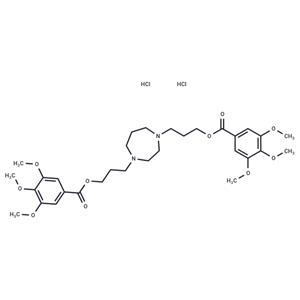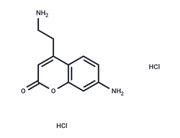| Name | Dilazep dihydrochloride |
| Description | Dilazep dihydrochloride is an adenosine uptake inhibitor. Dilazep dihydrochloride also inhibits the ischemic damage, membrane transport of nucleosides and platelet aggregation. Dilazep dihydrochloride has cerebral and coronary vasodilating action through enhancement of effect of adenosine. |
| In vitro | Dilazep, NBI and Dipyridamole have been reported to inhibit the uptake of adenosine into different cells. The uptake mechanism has been studied extensively in vitro. In these compounds, Dilazep and NBI are almost 10 times more effective than Dipyridamole. Only Dilazep is water soluble and no solubility aiding organic solvent is needed for preparing an aqueous solution[1]. |
| In vivo | Dilazep acts by inhibiting phospholipase activation in reperfused heart mitochondria and preventing lipid peroxidation in cerebral ischemia and reperfusion, potentially reducing ischemic cerebral injury through increased cerebral blood flow and protection of vascular endothelial cell membranes. Importantly, low doses (0.04-0.1 mg/kg/min) amplify the effects of adenosine, significantly enhancing superior mesenteric arterial conductance (SMAC) and raising arterial plasma adenosine levels, with a clear correlation observed between adenosine levels and SMAC changes, showing a 193.4% change in SMAC and an EC50 value of 2.8 μM. However, the vasodilatory potentiation by Dilazep is nullified by 8-phenyltheophylline, though this does not interfere with isoproterenol-induced relaxation. |
| Storage | Powder: -20°C for 3 years | In solvent: -80°C for 1 year | Shipping with blue ice. |
| Solubility Information | DMSO : 65 mg/mL (95.93 mM), Sonication is recommended.
H2O : 80 mg/mL (118.06 mM)
|
| Keywords | ischemic | Adenosine | Dilazep Dihydrochloride | Dilazep | Dilazep dihydrochloride | uptake | vasodilation | potentiate | Inhibitor | cerebral | damage | inhibit |
| Related Compound Libraries | FDA-Approved & Pharmacopeia Drug Library | Bioactive Compound Library | Approved Drug Library | ReFRAME Related Library | Drug Repurposing Compound Library | Inhibitor Library | Anti-Cardiovascular Disease Compound Library | Bioactive Compounds Library Max |

 United States
United States



